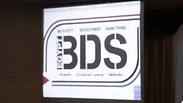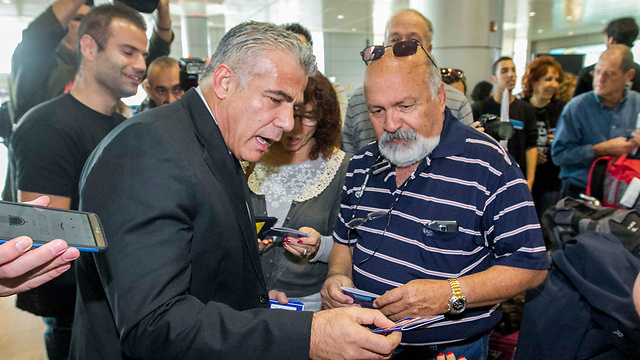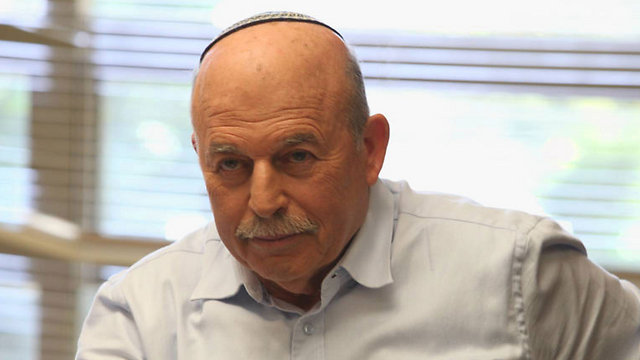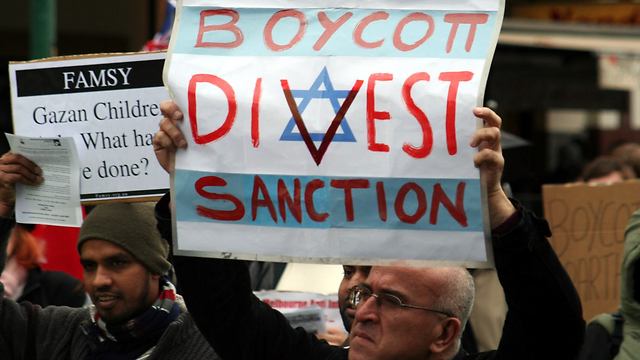
BDS. a main opponent of Israeli PR. (Photo: AP)
Photo: AP
Israel is not making effective use of its public relations budget which is set at NIS 500 million, according to a report by the Knesset's Research and Information Center.
According to the report, the budget is divided between too many government ministries, PR plans are not executed, and most of the activity is done by using existing manpower, rather than hiring employees specifically to that end.
The report indicates that PR duties are divided between the Prime Minister's Office, the Ministry of Communications, the Foreign Ministry, the Strategic Affairs Office, the IDF spokesperson, the marketing department at the Tourism Ministry, and other bodies that deal indirectly with PR.
The report, which was commissioned by the Knesset Constitution, Law, and Justice Committee's Chairperson MK Nissan Slomiansky (Bayit Yehudi), is supposed to inform the committee about boycotts of Israel around the world, detailing among other things the budgetary allocations for PR every year.
For example, the original budget of the PR department in the Prime Minister's Office was about NIS 4.3 millon, with the approved budget being set at NIS 8.4 million. However, the eventual budget use was significantly lower, standing at NIS 2.4 million. This means just 28 percent of the approved budget was used for PR purposes, while government ministers continue to speak publically of the supposed importance of battling boycotts and improving Israel's image abroad.
The public diplomacy department in the Foreign Ministry is one of the government departments central to aiding Israeli public relations in the world, creating long-term alliances with powerful world bodies as well as directing 106 representative stations around the globe. This includes professional training, holding conventions in Israel and abroad, and producing content and PR messages.
But the Foreign Ministry claims that no special budgets were allocated to combat the BDS movement, and the issue is mostly handled by diverting human resources and inner-departmental budgets to it. They further said that the anti-BDS program is expected to cost NIS 150 million over three years.
Employees for the program have already been recruited, in Israel and in diplomatic stations around the world, and its main points have been presented to the Finance Ministry, but approval for it is still pending.
According to MK Slomiansky, the report exposes a difficult reality of the Israeli PR establishment: even though budgets have grown to NIS 500 million a year in recent years, its effects seem to be lacking. "I believe that PR bodies in Israel need to make better use of the large budgets being dedicated to this important front, in a more efficient and focused way," he said.
The London embassy is pleased: BDS is being beaten
BDS activists on British campuses have been on the defensive lately, with Israel's embassy in London teaming up with dozens of Israeli and Jewish organizations around the country fighting the boycott efforts. Israeli diplomats have visited over 25 different campuses more than 50 times during the past academic semester. On the other end, BDS protests were few and poorly attended.
The Israeli embassy held a special event on the weekend, attended by Jewish student representatives from over 60 campuses around the country, along with heads of Jewish and pro-Israel associations. During the event, the embassy's recent activity was presented, alongside the plan for upcoming months. A crew of El Al ambassadors – pilots and flight attendants from the Israeli airline who volunteer do to PR work – gave a presentation on their activities.
In addition to intensive work done by the embassy, attempts by BDS activists to prevent Israeli representatives from arriving on campuses have failed. Embassy Spokesperson Yiftah Curiel said that these attempts are seen more and more as part of a general problem on British campuses, which is more about freedom of speech and academic freedom than it is about Israel.
Besides the progress on colleges and universities, a letter signed by British cultural figures who oppose a boycott of Israel has also recently gained publicity when it was endorsed by famous British author JK Rowling.
"During the past few months' activities, in campuses around the country - from Scotland to Northern Ireland - and in London itself, we have discovered that there is a greater willingness than before to engage in a dialogue. Pro-Palestinian activists have chosen to come to our events and ask challenging questions, rather than stand outside holding signs. Our message to British students is that the solution to the Israeli-Palestinian conflict will come through discussions, while BDS activity is based on separation and a lack of discussion, and thus does not promote a solution," Curiel said.
He added that "the interest in British campuses about the happenings in the Middle East is huge, and we participated in events of varying topics - from the Iranian nuclear program to terrorism, and of course the Israeli-Palestinian issue."
Alon Portman, manager of the El Al Ambassadors program, said: "The El Al Ambassadors program is a new tiding in the battle against BDS. We have 250 participants, pilots and flight attendants who volunteer in their free time. They've had 370 appearances in El Al destinations already. They don't talk about politics or their military service, but about Israelis, their families, and the reasons they choose to live in Israel. The tough questions always come at the end, but they manage to create positive events on campuses, in an Israeli context. This is the first time in history that a private-sector company has been involved in the Foreign Ministry's public relations efforts."




















